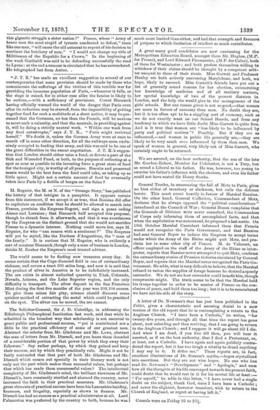General Trochu, in announcing the fall of Metz to Paris,
gives no hint either of treachery or slackness, but calls the defence heroic. This must count heavily in favour of Marshal Bazaine. On the other hand, General Coffiniare, Commandant of Meta, declares that he always opposed the "political considerations" introduced at the Council of War ; General Bisson complains that the Generals of Division were never consulted, the Commanders of Corps only informing them of accomplished facts, and that when the capitulation was announced, he proposed a last sortie. On 18th October Marshal Canrobert informed them that Prussia would not recognize the Paris Government, and that Bazaine had sent General Boyer to induce the Empress to accept terms under which the Army of the Rhine might quit Metz, and pro- claim her in some other city of France. M. de Valcourt, an officer employed on the staff of the Army of the Rhine as inter- preter, reports that Bazaine never attempted to quit Metz, confirms the extraordinary stories of Prussian victories circulated by General Boyer, and repeats that the Marshal never recognized the Paris Go- vernment. He adds, what is very difficult to believe, that the Marshal refused to ration the supplies of forage because he desired a speedy surrender. We do not see how surrender could benefit him, though compromise might. The truth seems to be that the Marshal held his troops together in order to be master of France on the con- clusion of peace, and held them too long ; but it is to be remembered we have not his side of the story.


































 Previous page
Previous page